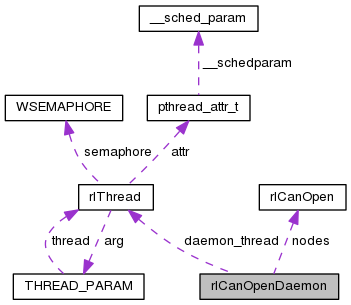canopen tcp/ip interface for concurrent device-access of multiple clientprocesses More...
#include <rlcanopendaemon.h>

Public Member Functions | |
| rlCanOpenDaemon () | |
| empty constructor initializes on port 5000. More... | |
| rlCanOpenDaemon (int _port, char *_iniFileName=0) | |
| main constructor sets port and inifilename. More... | |
| ~rlCanOpenDaemon () | |
| destructor destroys rlcanopen object More... | |
| int | getPort () |
| returns value of current port More... | |
| void | start () |
| runs service in endless loop More... | |
Public Attributes | |
| rlCanOpen * | nodes |
| rlThread | daemon_thread |
Private Attributes | |
| int | port |
Detailed Description
canopen tcp/ip interface for concurrent device-access of multiple clientprocesses
this is a multi threaded server process, which listens on a tcp port for incomming connections. It runs the only recommended instance of rlcanopen class for beeing the very only process accessing the device. Different processes who concurrently try to access the device will be queued autmaticly by daemonprocess. These processes are inteded to communicate through rlcanopenclient.
Definition at line 51 of file rlcanopendaemon.h.
Constructor & Destructor Documentation
◆ rlCanOpenDaemon() [1/2]
| rlCanOpenDaemon::rlCanOpenDaemon | ( | ) |
empty constructor initializes on port 5000.
empty constructor initializes on port 5000. creates a new rlCanOpen Object which performs all access to canopen device
Definition at line 253 of file rlcanopendaemon.cpp.
◆ rlCanOpenDaemon() [2/2]
| rlCanOpenDaemon::rlCanOpenDaemon | ( | int | _port, |
| char * | _iniFileName = 0 |
||
| ) |
main constructor sets port and inifilename.
main constructor sets port and inifilename.
creates a new rlCanOpen Object which performs all access to canopen device
Definition at line 259 of file rlcanopendaemon.cpp.
◆ ~rlCanOpenDaemon()
| rlCanOpenDaemon::~rlCanOpenDaemon | ( | ) |
destructor destroys rlcanopen object
destructor destroys rlcanopen object
Definition at line 272 of file rlcanopendaemon.cpp.
Member Function Documentation
◆ getPort()
| int rlCanOpenDaemon::getPort | ( | ) |
returns value of current port
returns value of current port
Definition at line 280 of file rlcanopendaemon.cpp.
◆ start()
| void rlCanOpenDaemon::start | ( | ) |
runs service in endless loop
daemon creates a listener thread which handels incoming connections by himself creating clientconnection threads for each client connecting to the daemon.
Definition at line 288 of file rlcanopendaemon.cpp.
Member Data Documentation
◆ daemon_thread
| rlThread rlCanOpenDaemon::daemon_thread |
rlThread object which manages basic thread functionality e.g. locking to prevent threads from concurrently accessing the canopen device
Definition at line 81 of file rlcanopendaemon.h.
◆ nodes
| rlCanOpen* rlCanOpenDaemon::nodes |
pointer to rlCanOpen Object which performs all access to canopen device
Definition at line 76 of file rlcanopendaemon.h.
◆ port
|
private |
Definition at line 84 of file rlcanopendaemon.h.
The documentation for this class was generated from the following files:
 1.8.14
1.8.14